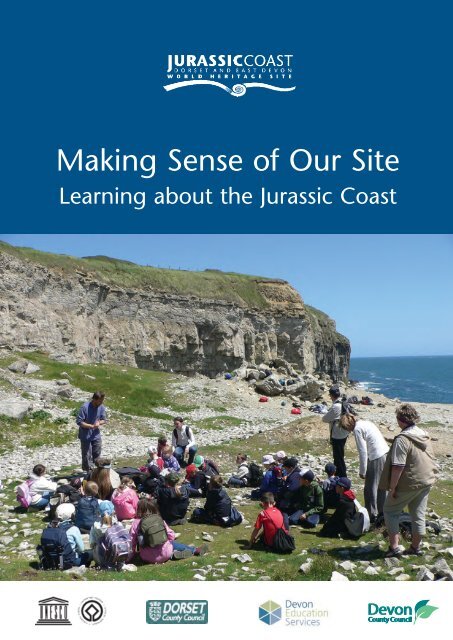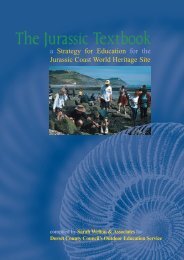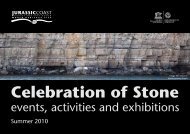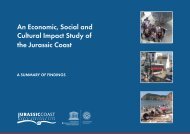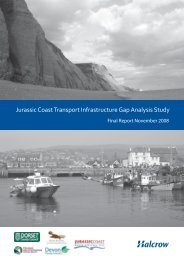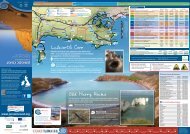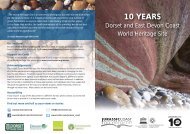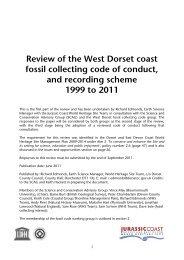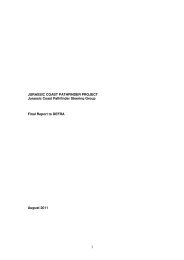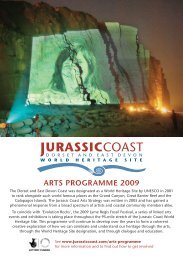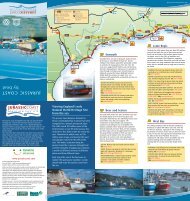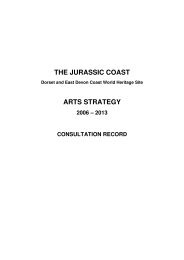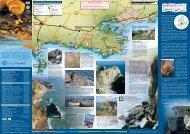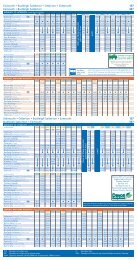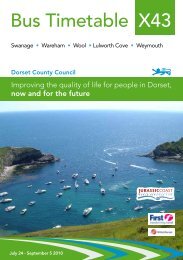Jurassic Coast Education Strategy
Jurassic Coast Education Strategy
Jurassic Coast Education Strategy
Create successful ePaper yourself
Turn your PDF publications into a flip-book with our unique Google optimized e-Paper software.
1<br />
Making Sense of Our Site<br />
Learning about the <strong>Jurassic</strong> <strong>Coast</strong>
Contents<br />
Foreword 2<br />
Driving Forward <strong>Education</strong> on the <strong>Jurassic</strong> <strong>Coast</strong> 3<br />
Our Aim 4<br />
Our Objectives 4<br />
Outputs: How will we achieve these 5<br />
Site Management Details 8<br />
Linked Strategies and Frameworks 8<br />
Working with World Heritage 9<br />
A Selection of Case Studies 10<br />
Lifelong Learning and Volunteering 15<br />
Some Case Studies 16<br />
<strong>Education</strong> Opportunities 17<br />
Outdoor <strong>Education</strong> 23<br />
References 28
2<br />
Foreword<br />
The Dorset and East Devon <strong>Coast</strong> is England’s first natural World Heritage Site<br />
and is commonly known as the <strong>Jurassic</strong> <strong>Coast</strong>. This unique stretch of coastline<br />
has joined the ranks of the Great Barrier Reef and the Grand Canyon as one of the<br />
wonders of the natural world. The <strong>Jurassic</strong> <strong>Coast</strong> was designated a World Heritage Site<br />
in 2001 by the United Nations <strong>Education</strong>al, Scientific and Cultural Organisation<br />
(UNESCO) due to its outstanding geology, which represents 185 million years of<br />
earth history in just 95 miles. The variety of landslides, beaches, bays and cliffs results<br />
in a constantly changing landscape, with spectacular features such as the Hooken<br />
Landslide, Chesil Beach and Durdle Door.<br />
The <strong>Jurassic</strong> <strong>Coast</strong> is a world-famous educational resource and historically it has<br />
played a key role in the study of Earth Sciences. It is our duty to manage our World<br />
Heritage Site effectively and education plays a crucial role in all aspects of site<br />
management.<br />
What are World Heritage Sites<br />
UNESCO World Heritage Sites are places of outstanding universal value. They are<br />
environments, buildings or artefacts which are particularly important to the history,<br />
culture and fabric of humanity as a whole. They are places which represent our past<br />
and which we will pass on to future generations. Despite the fact that World Heritage<br />
Sites belong to the whole world, heritage as a concept is often very personal. It is<br />
possible to view World Heritage Sites as a collection of stories; stories of both human<br />
and earth history that when compiled reflect the things that give our lives and homes<br />
meaning.<br />
<strong>Education</strong> forms an intrinsic part of managing World Heritage Sites and is<br />
specifically referred to in Article 27 of the World Heritage Convention (1972), where<br />
educational and information programmes can be used ‘to strengthen appreciation and<br />
respect by their peoples of the cultural and natural heritage defined in Articles 1 and 2 of<br />
the Convention.’
3<br />
Driving forward <strong>Education</strong><br />
on the <strong>Jurassic</strong> <strong>Coast</strong><br />
Five years ago, The <strong>Jurassic</strong> Textbook (2003) proposed<br />
innovative ways in which the <strong>Jurassic</strong> <strong>Coast</strong>, England’s<br />
first natural World Heritage Site, could be used as a tool to<br />
promote an understanding of not only the outdoor<br />
environment but also the value of Earth Science to many<br />
educational audiences. Since the launch of this strategy,<br />
and the appointment of a <strong>Jurassic</strong> <strong>Coast</strong> <strong>Education</strong><br />
Coordinator, there have been many achievements, most<br />
notably in the formal education sector.<br />
The <strong>Jurassic</strong> <strong>Coast</strong> has enabled and resourced over 350<br />
teachers to bring the message of the World Heritage Site<br />
into their classrooms. Over 2000 children and young<br />
people have been engaged directly in projects associated<br />
with the <strong>Jurassic</strong> <strong>Coast</strong>. Successful funding for many of<br />
these projects has been secured from the <strong>Jurassic</strong> <strong>Coast</strong><br />
Trust and the Heritage Lottery Fund. There is now an<br />
established Schools Day at the annual Lyme Regis Fossil<br />
Festival where hundreds of children and young people<br />
have a chance to experience the wonder of the <strong>Jurassic</strong><br />
<strong>Coast</strong> first hand. In addition, the <strong>Jurassic</strong> <strong>Coast</strong> has<br />
established strategic partnerships with leading national<br />
bodies for science and geographical education such as the<br />
Geological Society, Royal Geographical Society, the Natural<br />
History Museum, the UK National Commission for UNESCO<br />
and Natural England. As new challenges and opportunities<br />
come to the fore, such as the London 2012 Olympic<br />
Games and the evolving 3–19 years educational<br />
entitlement, the <strong>Jurassic</strong> <strong>Coast</strong> education guidelines must<br />
develop and adapt to encompass these changes.
4<br />
Our Aim<br />
The <strong>Jurassic</strong> <strong>Coast</strong> covers 95 miles of truly stunning coastline from East<br />
Devon to Dorset, with rocks recording 185 million years of the Earth’s<br />
history. It is the international importance of the rocks, fossils and<br />
landforms that are the core values of the World Heritage Site and these<br />
factors play an important part in shaping our aims and objectives.<br />
World Heritage status was achieved because of the site’s unique<br />
insight into the Earth Sciences which depicts a geological ‘walk<br />
through time’ spanning the Triassic, <strong>Jurassic</strong> and Cretaceous periods.<br />
In order to increase awareness and understanding of the values of the<br />
<strong>Jurassic</strong> <strong>Coast</strong> as a World Heritage Site and to give communities a<br />
sense of pride and ownership, we have identified four key objectives:<br />
Our Objectives<br />
• To improve access to outdoor education facilities and create<br />
learning resources along the <strong>Jurassic</strong> <strong>Coast</strong>.<br />
• To create resources that focus on the values of the World<br />
Heritage Site and to effectively disseminate these.<br />
• Increased harmonisation of the values of the World Heritage Site<br />
with the formal school curriculum from 3–19 years.<br />
• Increased opportunities for lifelong learning and engaging with<br />
the conservation of the <strong>Jurassic</strong> <strong>Coast</strong>.
5<br />
St Joseph’s Primary School pupils visit the<br />
Charmouth Heritage <strong>Coast</strong> Centre<br />
Outputs: How will we achieve these<br />
1. Generating educational resources means not only brochures, text<br />
material, displays and web-based material, but also learning trails,<br />
viewpoints and signage. We will find out what is already available from<br />
a range of sources (including commercially published materials),<br />
identify gaps in provision, identify potential creators, seek funding and<br />
commission new resources, based on what is known about the<br />
effectiveness of existing materials. Developments and progression<br />
within the school curriculum will be taken account of in the<br />
development of resources. We will seek opportunities to build on new<br />
and upcoming Department of Children, Schools and Families (DCSF)<br />
education initiatives (e.g. The Action Plan for Geography and the<br />
Diploma for Environmental and Land Based Studies) which will help us<br />
to remain relevant to the needs of teachers, children and young<br />
people. A sub-group within the <strong>Jurassic</strong> <strong>Coast</strong> <strong>Education</strong> Working<br />
Group (EWG) will be set up to facilitate and co-ordinate the above,<br />
and to disseminate findings.<br />
2. Co-ordinating educational initiatives will be based on a database<br />
of users and providers currently being generated, and will foster links<br />
between these groups as well as dissemination of existing good<br />
practice. Network links such as chat-rooms can be set up, and<br />
occasional single-issue meetings will be convened to foster links in<br />
areas where these are currently in the early stages. Such meetings can<br />
also be valuable sources of feedback on provision. An e-<br />
newsletter/hardcopy will be distributed three times a year to all the<br />
<strong>Education</strong> and Heritage centres, schools, and community groups in<br />
Dorset and Devon, to help them know what is going on at the centres<br />
along the coast, the resources available to them, new developments<br />
and how the <strong>Jurassic</strong> <strong>Coast</strong> can help to deliver the evolving<br />
curriculum. This is in response to the challenges we are aware of in the<br />
dissemination of information to partners and especially between<br />
centres and schools.
6<br />
Redbridge Community School pupils on a<br />
teambuilding exercise at Leeson House<br />
3. Developing and co-ordinating field study facilities is a key aspect<br />
of the EWG’s role. We will work towards the provision of further<br />
facilities, improve resources at existing centres, develop further<br />
training for wardens, instructors and volunteers, and identify gaps in<br />
provision, e.g. along the East Devon section of the <strong>Jurassic</strong> <strong>Coast</strong>. We<br />
will respond to requests to assist in the development of education<br />
facilities at the various visitor centre/field centre projects as identified<br />
in the <strong>Jurassic</strong> <strong>Coast</strong> World Heritage Site Management Plan. Existing<br />
research will be used to stress the value to users, and we will lobby<br />
relevant authorities via the Steering Group to support initiatives.<br />
National examples of good practice, such as the National Trust<br />
Guardianship scheme, will be disseminated as models via the<br />
newsletter. The EWG will liaise with local press and seek further<br />
support from education providers in the area.<br />
4. Developing working partnerships is another key aspect of our<br />
work. We will maintain and develop links with local authorities with a<br />
view towards assisting in the delivery of the Devon and Dorset Children<br />
and Young People’s Plans. We aim to link individual schools and<br />
community groups with education centres and other sources of<br />
potential support along the <strong>Jurassic</strong> <strong>Coast</strong>. We will do this by<br />
identifying active schools and groups, fostering visits and placements<br />
and arranging meetings for those interested in partnerships, based on<br />
best practice models from elsewhere. We will strive to work in<br />
coordination with relevant teams based within County and District<br />
Councils to emphasise the importance of effective education<br />
strategies. The EWG will also act as facilitators to seek funding for and<br />
commission small-scale case studies of working partnerships, and<br />
disseminate these to interested parties.
7<br />
5. Engaging with teacher education initiatives is a very important<br />
objective. We plan to make full use of this valuable resource in terms<br />
of both initial and in-service teacher training in university departments<br />
of education as well as the Southwest Regional Science Learning<br />
Centre. This collaboration has benefits for both partners, and could be<br />
a major way of generating new links and partnerships. The EWG will<br />
monitor and disseminate what is learned, as well as inviting partners<br />
to share their experiences at single-issue meetings or via the<br />
newsletter.<br />
6. Developing national and international links will involve<br />
strengthening partnerships with similar sites in the UK (e.g. English<br />
Riviera UNESCO Geopark<br />
and at Runswick Bay in<br />
North Yorkshire) and<br />
overseas. The Association for<br />
Science <strong>Education</strong> (ASE)<br />
‘Science Across the World’<br />
website is an established<br />
forum for schools to<br />
exchange ideas, and could<br />
be used as one vehicle for<br />
St Lucian teachers at a UNESCO/<strong>Jurassic</strong> <strong>Coast</strong><br />
linking. The EWG will also teacher training event<br />
publicise our work via professional journals, and we will explore the<br />
possibility of working with the Council for Subject Associations as a way<br />
to disseminate ideas. Links with other World Heritage sites could be<br />
fostered in the same way. We will continue to maintain strong links<br />
with national organisations such as the UK National Commission for<br />
UNESCO, the Royal Geographical Society and the Natural History<br />
Museum in order to sustain our national profile and commitment to<br />
the excellence of environmental education and learning for<br />
sustainability.
8<br />
Site Management Details<br />
Management of the <strong>Jurassic</strong> <strong>Coast</strong> World Heritage Site is the responsibility of many organisations;<br />
public and private, local, regional and national. The World Heritage Site Steering Group represents<br />
these organisations and is charged by the UK Government to oversee the implementation of the<br />
<strong>Jurassic</strong> <strong>Coast</strong> World Heritage Site Management Plan. The Site Management Plan covers a wide<br />
range of disciplines, including conservation, education and visitor management and delivery is led<br />
by a range of Working Groups, supported by specialists within the <strong>Jurassic</strong> <strong>Coast</strong> World Heritage<br />
Team. The <strong>Education</strong> Working Group, formed in 2003, consists of a broad partnership of education<br />
professionals who support the delivery of the education programmes along the <strong>Jurassic</strong> <strong>Coast</strong>.<br />
Linked Strategies and Frameworks<br />
<strong>Strategy</strong> or Framework<br />
DCSF<br />
• Every Child Matters: Change for Children<br />
(Government Green Paper, September 2003)<br />
• Learning Outside the Classroom Manifesto<br />
(November 2006)<br />
• Early years foundation stage, primary and<br />
secondary National Curriculum<br />
Devon County Council<br />
• Changing Our Futures: Learning for Sustainability<br />
in Devon (2007)<br />
• Children and Young People’s Plan (2008-11)<br />
• Raising Achievement Plan (2007-8)<br />
• Devon <strong>Education</strong> Services<br />
Dorset County Council<br />
• Dorset Children and Young People’s Plan (2007-9)<br />
• Raising Pupil and School Achievement Plan (2007-8)<br />
• Dorset Outdoor <strong>Education</strong> Service<br />
<strong>Jurassic</strong> <strong>Coast</strong> World Heritage Site<br />
• <strong>Jurassic</strong> Textbook: A <strong>Strategy</strong> for <strong>Education</strong> for the<br />
<strong>Jurassic</strong> <strong>Coast</strong> World Heritage Site (2003)<br />
• World Heritage Site Management Plan (2003,<br />
revision in process)<br />
• Access and Inclusion Policy (in preparation)<br />
National Trust<br />
• A Vision for Learning (2004-7)<br />
Natural England<br />
• Strategic Direction Summary Document (2008-13)<br />
UNESCO<br />
• World Heritage Convention (1972)<br />
Reference<br />
www.everychildmatters.gov.uk<br />
www.teachernet.gov.uk/teachingandlearning/<br />
resourcematerials/outsideclassroom/<br />
http://curriculum.qca.org.uk/<br />
www.devon.gov.uk/index/learning/<br />
plans_and_strategies/changingourfutures<br />
www.devon.gov.uk/cypplan2008<br />
www.devon.gov.uk/cyps-raising-achievement-plan.pdf<br />
www.deseducation.org<br />
www.dorsetforyou.com/index.jsparticleid=345164<br />
www.dorsetforyou.com/index.jsparticleid=359703<br />
www.dorsetforyou.com/index.jsparticleid=384999<br />
www.jurassiccoast.com/299/managing-the-site37/whsmanagement-167/world-heritage-site-management-370.html<br />
www.nationaltrust.org.uk/main/wvision_for_learning.pdf<br />
http://naturalengland.communisis.com/NaturalEnglandShop/<br />
default.aspx<br />
http://whc.unesco.org/documents/publi_basictexts_en.pdf<br />
http://whc.unesco.org/documents/publi_infokit_en.pdf
9<br />
Working with<br />
World Heritage<br />
The <strong>Jurassic</strong> <strong>Coast</strong> World Heritage Site<br />
has an active World Heritage<br />
education programme, offering a wide<br />
range of opportunities and projects that<br />
people of all ages can get involved in.<br />
Many of these projects help children and<br />
young people in particular to interpret<br />
the geology and science of the site<br />
through many creative and accessible<br />
means.
10<br />
A Selection of Case Studies<br />
1. Videoconferencing with Natural History Museum Scientists<br />
Pupils at the Purbeck School had an opportunity to question expert<br />
scientists at the Natural History Museum about fossils they were<br />
researching as part of a science class through videoconferencing. Dr<br />
Jeremy Rowe, a biology teacher, helped the class of pupils to dissolve<br />
a block of shale to reveal the microfossils that were hidden inside. In<br />
addition, pupils analysed an ancient fossil insect comparing it to<br />
species that are seen today. One of the exciting outcomes of the<br />
Question and Answer session with the scientists was that the pupils<br />
were able to get a species name for the rare dragonfly fossil kept at<br />
their school.<br />
2. Festivals as a means to engage audiences<br />
East Devon District Council’s annual<br />
<strong>Coast</strong>al Festival celebrates the rich<br />
diversity of the <strong>Jurassic</strong> <strong>Coast</strong> in East<br />
Devon. James Chubb, the Council’s<br />
<strong>Education</strong> Ranger, co-ordinates the<br />
event, and is on hand to help children<br />
and families discover the highlights of<br />
the marine environment through<br />
rockpooling events, snorkel safaris,<br />
strandline scavenger hunts and<br />
dolphin watching from Beer Head.<br />
Other major activities at the Festival include the ‘Triassic Big Draw’<br />
which uses the red sandstone pigments from the Sidmouth cliffs as<br />
paint. Members of the public are asked to help paint a huge picture of<br />
Triassic creatures, the result of which then goes on tour around the<br />
District’s public galleries.
11<br />
3. <strong>Jurassic</strong> <strong>Coast</strong> Banners<br />
Exmouth Community College students worked with artist, Jane<br />
Witheridge to develop <strong>Jurassic</strong> <strong>Coast</strong> themed banners. Based on six<br />
unique designs inspired by the Triassic, <strong>Jurassic</strong> and Cretaceous<br />
geological periods, the banners are on display at six locations<br />
throughout Exmouth. Pupils sketched out their fossil inspired designs<br />
and worked with Jane to draw up the final pieces. Using a batik<br />
technique to paint onto silk fabric, the young people had a chance to<br />
watch their creations come to life. The project was such a great<br />
success that Seaton is now developing a similar project. Pupils from<br />
Seaton Primary School and Axe Valley Community College adopted a<br />
‘walk through time’ theme, and are using their local heritage and<br />
landscape as inspiration for the designs. The banners will be on display<br />
in Seaton town centre and along the seafront.<br />
4. Urban-Rural School linking<br />
Southwell Primary School on Portland maintains a strong link with<br />
Dairy Meadow Primary School in Southall, near London. The linking<br />
programme embraces subjects across the curriculum such as<br />
Citizenship, Geography and Science. One project helped pupils from<br />
both schools examine their local heritage links through Portland<br />
Stone. In London, Dairy Meadow<br />
pupils visited St Pauls Cathedral to<br />
see how the stone had been<br />
carved and used in the building.<br />
On Portland, pupils had a chance<br />
to try their hand at stone carving<br />
in Portland Stone that came from a<br />
Quarry on the Island. This linking<br />
programme is an excellent example of how creating a culture of<br />
tolerance, respect and awareness of natural and cultural heritage can<br />
enrich the lives of school pupils.
12<br />
5. ‘<strong>Jurassic</strong> Fantastic’ Family Activity week<br />
‘<strong>Jurassic</strong> Fantastic’ week took place at the Dorset County Museum in<br />
the summer holidays to provide family learning opportunities for local<br />
people and holiday makers. The new <strong>Jurassic</strong> <strong>Coast</strong> Gallery was the<br />
focus for the week and inspired many different activities. These<br />
included a drama workshop based on Mary Anning, a storytelling<br />
session about fossils and dinosaurs in the gallery, a 3D art workshop<br />
where the families worked alongside an artist to produce a wall panel<br />
based on one section of the coast and an animation workshop where<br />
the families made short films looking at how people use the coast.<br />
Parents were encouraged to participate in activities with their children<br />
which enhanced their experiences of the event.<br />
6. <strong>Jurassic</strong> <strong>Coast</strong> Mosaics at the Lulworth Heritage <strong>Coast</strong> Centre<br />
The Lulworth Estate in partnership<br />
with DepARTure (Dorset County<br />
Council Arts <strong>Education</strong> Service)<br />
helped children and young people<br />
get more in touch with the World<br />
Heritage Site on their doorstep. A<br />
group of 25 ‘gifted and talented’<br />
mixed age students worked<br />
closely with Anita Andrews to learn about the landscape that makes<br />
Lulworth unique. Using photos taken on a field trip, the class designed<br />
a visual impression of the landscape which was then painted onto tiles<br />
that were later fired, then broken up and used in the overall mosaic<br />
design. The eyecatching mosaics are displayed outside the entrance,<br />
seen by half a million visitors each year. They depict two wildlife<br />
themes: ‘land’ and ‘sea’ inspired by Lulworth and the <strong>Jurassic</strong> <strong>Coast</strong><br />
World Heritage Site.
13<br />
7. Creating conservationists for the future at Kimmeridge<br />
A new and exciting project was launched at the Purbeck Marine<br />
Wildlife Reserve in 2007, aimed at engaging local teenagers in marine<br />
conservation along the <strong>Jurassic</strong> <strong>Coast</strong>. Each year a group of 15 young<br />
people, aged 13 to 19 years, are trained in a wide variety of marine<br />
biology and conservation topics, from learning to identify rockpool<br />
creatures to conducting important seashore surveys monitoring<br />
climate change indicators. In addition, the Young Marine Wardens<br />
learn basic aquarium management, discover life beneath the waves<br />
and help conserve the marine environment. The course is based on<br />
practical activities and includes trips to other marine attractions and<br />
the opportunity to gain a PADI snorkelling qualification! This<br />
qualification will enable the young people to undertake supervised inwater<br />
surveys including looking for invasive species and the native<br />
wildlife such as the seahorse. As part of the project, young people can<br />
work towards their Duke of Edinburgh Awards.<br />
8. Global Citizens: Olympic Dreams<br />
This pilot project funded by<br />
DepARTure and the <strong>Jurassic</strong> <strong>Coast</strong> Trust<br />
helped pupils from four inland schools<br />
investigate the experiences that<br />
athletes and visitors might have when<br />
they visit Weymouth and Portland for<br />
the London 2012 sailing events. Pupils<br />
had a chance to sail on boats into<br />
Weymouth Bay and view the <strong>Jurassic</strong> <strong>Coast</strong> from the sea. Working with<br />
artist Esther Yarnold, they captured their experiences through digital<br />
photography and developed their artwork through specific themes<br />
such ‘green games’ and ‘accessiblity for all’. Esther then spent time<br />
with each school helping the children to choose their favourite<br />
pictures of the day and to create final digital pieces of artwork.
14<br />
9. <strong>Jurassic</strong> <strong>Coast</strong> Trust supports <strong>Education</strong> Projects<br />
The <strong>Jurassic</strong> <strong>Coast</strong> Trust (JCT) works with partners to support a diverse range of<br />
education, conservation, arts and science projects along the length of the <strong>Jurassic</strong> <strong>Coast</strong>.<br />
Some of the projects that the JCT have funded include fossil boxes for Heritage Centres<br />
and schools, <strong>Jurassic</strong> <strong>Coast</strong> field trips and also student teacher development. The<br />
Charmouth Heritage <strong>Coast</strong> Centre hosted the first <strong>Jurassic</strong> <strong>Coast</strong> student teacher<br />
placement as part of a wider programme to encourage and enhance out-of-school<br />
learning with trainee teachers. Rebecca Powell, a PGCE student at Exeter University,<br />
spent a week at the centre working alongside resident wardens to experience informal<br />
learning experiences of primary age children. The one week placement funded by the<br />
<strong>Jurassic</strong> <strong>Coast</strong> Trust, forms part of her assessment which will eventually lead to fully<br />
qualified teacher status. The innovative placement scheme has been pioneered by<br />
Exeter University, and is a model that is attracting attention from other teacher training<br />
departments. The teacher placements form part of a new initiative to strengthen links<br />
between teacher training institutions and Heritage centres along the <strong>Jurassic</strong> <strong>Coast</strong>.<br />
UNESCO Associated Schools Project Network (ASPNet)<br />
UNESCO Associated Schools is a worldwide network of schools that are engaged in<br />
fostering and delivering quality education in pursuit of peace, liberty, justice and human<br />
development in order to meet the pressing educational needs of children and young<br />
people throughout the world. The main objectives of UNESCO Associated Schools are<br />
to integrate internationalism into the curriculum alongside themes that schools can<br />
choose to adopt. One of these themes is the UNESCO ‘World Heritage in Young Hands’<br />
project, which was launched in 1994 to raise awareness among students and teachers<br />
around the globe about World Heritage conservation. Across the UK there are a<br />
multitude of World Heritage Sites that can link up to explore the variety of natural and<br />
cultural heritage on their doorstep. The <strong>Jurassic</strong> <strong>Coast</strong> is leading on a national education<br />
programme to coordinate UK World Heritage Sites with schools as part of a national<br />
strategy to promote diversity and citizenship across the curriculum. UNESCO Associated<br />
Schools along the <strong>Jurassic</strong> <strong>Coast</strong> will be encouraged to participate in this programme.
15<br />
Lifelong Learning<br />
and Volunteering<br />
An important part of ensuring that the <strong>Jurassic</strong> <strong>Coast</strong> has a<br />
sustainable future includes involving local communities in<br />
opportunities that enhance their learning about the site and activities<br />
that contribute to the conservation of the site. Significant changes<br />
within the lifelong learning sector mean that the two strands of<br />
learning are emerging. Accredited, work-related training delivered via<br />
adult learning centres that are supported by Local Authorities and<br />
personal, community and development learning (or ‘leisure’ and nonaccredited<br />
courses) delivered through organisations such as the<br />
Workers <strong>Education</strong>al Association (WEA) and the University of the Third<br />
Age (U3A).<br />
The <strong>Jurassic</strong> <strong>Coast</strong> with its extraordinary natural assets, broad range<br />
of expertise among staff in Heritage centres and dedicated teams of<br />
volunteers, provides considerable scope for formal and informal<br />
lifelong learning opportunities. Each centre offers opportunities for<br />
individuals to participate in activities that help to support the<br />
management, conservation and interpretation of the coast, with a<br />
view towards encouraging a sense of place and pride about their<br />
environment.<br />
Another key objective for informal audiences is to assist in capacity<br />
building for voluntary and community organisations across the <strong>Jurassic</strong><br />
<strong>Coast</strong>. There is a strong aim towards increasing volunteering numbers<br />
and volunteering skills in advance of 2012, and addressing the<br />
sustainability of participating organisations. In addition there is also an<br />
identified need to engage people from a broader cross-section of the<br />
local communities along the coast, and good practice in volunteer and<br />
trustee recruitment and management (based on the <strong>Jurassic</strong> <strong>Coast</strong><br />
Access and Inclusion Policy) will ensure a long-lasting sense of<br />
ownership and pride in the projects. This should contribute to the<br />
sustainability of individual projects in a number of respects.
16<br />
Some Case Studies<br />
Community Volunteering at Beer<br />
Beer Village Heritage was formed to educate people about the natural and social history,<br />
conservation and environment of Beer. It runs the Fine Foundation Centre and also<br />
provides a programme of walks, talks and activities. The organisation relies on an<br />
economically viable village with a good community structure to produce volunteers with<br />
differing skills as required. When the new centre was being created, fundraising, project<br />
management and practical skills were needed. Now the centre relies on regular<br />
volunteers who open, close and clean the centre, feed the fish and collect the donation<br />
money on a daily basis. The Trustees (also volunteers) call on wider group of volunteers<br />
with a range of skills, such as artists, designers, computer experts, event leaders (e.g<br />
guides, ornithologists) lace makers and cake makers to create the programme of events.<br />
Much of the volunteering is ‘ad hoc’ – local fishermen drop in daily, helping to keep an<br />
eye on the centre. Children are also encouraged to keep an eye on the centre and to help<br />
with rockpooling safaris which appeal to all ages. Training sessions are organized for<br />
those helping with specific events such as rockpooling. The aim is to encourage anyone<br />
and everyone to join in.<br />
Lifelong Learning at Durlston<br />
Durlston Country Park currently provides a varied<br />
programme of more than 70 guided walks and events<br />
each year. In addition to these highly attended events,<br />
Durlston offers dry-stone walling training courses,<br />
wildflower identification workshops, hedge-laying<br />
training courses and landscape painting workshops. A Voluntary Wardens scheme was<br />
established in 2003 to establish a group of volunteers to assist with the management and<br />
monitoring of Durlston in the Wares. More than 20 short courses hosted by Durlston staff<br />
have been provided to this group on subjects including botanical survey techniques,<br />
wildlife ID and livestock management. Durlston also established an Apprentice Ranger<br />
scheme in 2005 to provide training opportunities for young people aged 16-25.<br />
Apprentices receive a training allowance, National Vocational Qualification (NVQ) Level<br />
2 or 3 in Environmental Conservation and a range of other accredited qualifications<br />
including First Aid, LANTRA (a Sector Skills Council for the environmental and land-based<br />
sector) Brushcutter course, Health and Safety and others. The scheme is delivered<br />
through a partnership with Kingston Maurward College in Dorchester.
17<br />
<strong>Education</strong><br />
Opportunities<br />
The <strong>Jurassic</strong> <strong>Coast</strong> is a classic fieldwork<br />
site that attracts thousands of<br />
schools, colleges and universities every<br />
year. Locations such as Old Harry Rocks,<br />
Lulworth Cove, Chesil Beach and Lyme<br />
Regis are now classic fieldwork<br />
destinations for pupils studying a range<br />
of subjects. The Heritage Centres along<br />
the <strong>Jurassic</strong> <strong>Coast</strong> are equipped to help<br />
schools and colleges explore aspects of<br />
the World Heritage Site through trained<br />
educational staff and dedicated<br />
classroom and fieldsite resources. In<br />
addition the <strong>Jurassic</strong> <strong>Coast</strong> Team in<br />
conjunction with Devon <strong>Education</strong><br />
Services offer a suite of classroom-based<br />
materials that are designed to integrate<br />
with the changing elements of the<br />
formal school curriculum 3–19 years.
18<br />
Learning themes<br />
Rocks, Fossils and Landforms<br />
Out and About<br />
• Dorset Important Geological Sites (DIGS) Group has created a<br />
special range of field guides to help A-Level Geology and Geography<br />
school groups interpret the geology of the coast and countryside of<br />
Dorset. Packs cost only £3.95 each and are available from the DIGS<br />
coordinator at walksinfo@dorsetrigs.org.uk<br />
• Rangers at the Charmouth Heritage <strong>Coast</strong> Centre can assist schools who wish<br />
to learn more about the rocks, fossils and marine wildlife of the <strong>Jurassic</strong><br />
<strong>Coast</strong>. The rangers run an extensive programme of activities for Key Stages<br />
1-3, and also with GCSE, A-Level and special educational needs groups.<br />
Popular schools activities include Fossil Hunting Walks, Investigating <strong>Coast</strong>s<br />
and Geography and Geology tours. Fossil loan boxes are also available to<br />
hire.<br />
• Lulworth is a classic destination to understand how geology shapes the<br />
landscape. The <strong>Education</strong> Team has a range of resources including ‘Lulworth<br />
Rocks’, a 28-page full colour A5 book explaining the rocks and landforms at<br />
Lulworth and interactive CDs with Powerpoint presentations, background<br />
notes, animations and practical data collection sessions.<br />
• Durlston Country Park offers a range of Discovery Sessions focusing on local<br />
geology. Schools can investigate local geology & stone quarrying, where<br />
they can visit two different quarries located in the Park. Study themes include<br />
rock formation, fossil evidence, resources and human impact on the<br />
landscape.<br />
In the Classroom<br />
• <strong>Jurassic</strong> <strong>Coast</strong> Fossil Dig Boxes are available for schools to hire from Dorset<br />
School Library Services and Devon Learning Resources. In addition, schools<br />
can book a fossil dig session at the following museums and Heritage Centres:<br />
Durlston Country Park, Purbeck Marine Wildlife Reserve Centre at<br />
Kimmeridge, Lulworth Heritage Centre, Dorset County Museum, Charmouth<br />
Heritage <strong>Coast</strong> Centre, Sidmouth Museum and through the <strong>Education</strong><br />
Ranger at East Devon District Council.<br />
• <strong>Jurassic</strong> <strong>Coast</strong> Schools’ Display can be hired through the Dorset School<br />
Library Services and Devon Learning Resources.<br />
• “185 million years younger! Rocks and fossils of the <strong>Jurassic</strong> <strong>Coast</strong>” is a KS2<br />
Science unit is a free CD of resources from the <strong>Jurassic</strong> <strong>Coast</strong> Team.
19<br />
<strong>Coast</strong>al processes and geomorphology<br />
Out and About<br />
• The Chesil Beach Visitor Centre offers audio-visual interpretations of the<br />
formation of Chesil Beach, a section through a Portland quarry, live sea<br />
bed camera pictures and much more. There is an information pack and DVD,<br />
which includes KS2 & 3 worksheets, available on request from the Centre.<br />
• National Trust Ranger-led sessions at Studland Bay help schools to<br />
understand the management and conservation of sand dunes and the<br />
surrounding coastal geomorphology. The site is especially valuable for Y5/6<br />
GCSE and AS/A2 studies.<br />
• Wardens at the Charmouth Heritage <strong>Coast</strong> Centre offer guided sessions<br />
exploring the coastal environments around Lyme Regis and Charmouth.<br />
In the Classroom<br />
• “Investigating <strong>Coast</strong>s” unit for KS2 Geography is available from Devon<br />
<strong>Education</strong> Services.<br />
Environmental Conservation and Landscape Management<br />
Out and About<br />
• The National Trust at Studland offer guided walks and conservation sessions<br />
on dry stone walling, heathlands, sand dunes and coastal path management.<br />
In addition they run a successful National Trust Guardianship scheme<br />
programme with local primary schools where children assist Rangers with<br />
scientific research and conservation.<br />
• Durlston Country Park offers Ranger-led sessions on Country Park<br />
management on a World Heritage Site and sustainability issues. A CD of<br />
resources is available.<br />
• Rangers at Lulworth incorporate education for sustainable development into<br />
all their guided programmes. There is a specific focus on sustainable tourism<br />
at Lulworth and managing and conserving sensitive ecological sites in a<br />
‘honeypot’ area.<br />
• At the Chesil Beach Visitor Centre, schools are encouraged to book guided<br />
walks in advance of their visit. Volunteer staff offer guided walks on a range<br />
of conservation issues concerned with the management of the Fleet Nature<br />
Reserve and how science can inform the management of the Site.<br />
continued over...
20<br />
• The Charmouth and Lyme Regis coast is<br />
characterised by active coastal landslides. Wardens at the Charmouth<br />
Heritage <strong>Coast</strong> Centre offer sessions to educational groups that focus on the<br />
conflicts between managing and conserving a protected landscape against a<br />
community that’s threatened by natural erosional processes.<br />
• The East Devon <strong>Education</strong> Ranger leads educational groups on a variety of<br />
environmental conservation projects in East Devon that focus on <strong>Education</strong><br />
for Sustainable Development.<br />
<strong>Coast</strong>al management and environmental issues<br />
In the Classroom<br />
• “<strong>Coast</strong>al conflicts: a geographical enquiry along the <strong>Jurassic</strong> <strong>Coast</strong>” is a DVD<br />
that explores the <strong>Jurassic</strong> <strong>Coast</strong> and the conflicts associated with coastal<br />
defence works. The DVD is supported by associated learning materials for<br />
Key Stage 2 and 3 and is available to purchase from Devon <strong>Education</strong><br />
Services (www.deseducation.org).<br />
• “The impact of landslides on Lyme Regis” is a free CD of resources available<br />
from <strong>Jurassic</strong> <strong>Coast</strong> Team.<br />
• “MSC Napoli Case Study” is a free CD of resources from the <strong>Jurassic</strong> <strong>Coast</strong><br />
Team detailing the impacts and effects of the cargo container ship beaching<br />
at Branscombe in East Devon.<br />
• A free “Marine <strong>Coast</strong>al <strong>Education</strong> pack” on CD is available from the Dorset<br />
<strong>Coast</strong> Forum. This unit of work focuses on a variety of issues including marine<br />
wildlife, coastal geomorphology and the effects of pollution on coastal<br />
habitats.<br />
Leisure and Tourism<br />
Out and About<br />
• Rangers at Lulworth Cove Heritage Centre offer taught field sessions on<br />
managing a ‘honeypot’ site for schools visiting Lulworth Cove.<br />
In the Classroom<br />
• A free “Tourism and the <strong>Jurassic</strong> <strong>Coast</strong>” CD of resources (created by the<br />
Learning Skills Network) is available from the <strong>Jurassic</strong> <strong>Coast</strong> Team.<br />
• A virtual fieldtrip exploring the new site for the Exmouth Visitor Centre is<br />
available on http://ulearn.infomapper.com/main (registration required).
21<br />
Biodiversity and wildlife<br />
Out and About<br />
• Ranger-led Discovery Sessions are offered at<br />
Durlston Country Park on Birds of the Cliff, Dolphins and the Marine<br />
Environment, Adaptations and Ecosystems and School Boat Trips.<br />
• Ranger-led sessions at Lulworth Cove help pupils explore the ecology and<br />
management of chalk downland and habitat around the local area and<br />
include opportunities for practical hands-on investigations<br />
• The <strong>Education</strong> Ranger at East Devon District Council works to promote<br />
access to the Local Nature Reserves in East Devon for school groups looking<br />
to use the available facilities. The Ranger is able to provide guided walks<br />
around the sites for whole and half day visits. The Ranger Service is offered<br />
to schools, colleges and local interest groups, free of charge from the District<br />
Council.<br />
• Wardens at the Kimmeridge Bay Marine Reserve provide schools with<br />
curriculum based talks/shore activities and equipment for use on the shore.<br />
Life Science activities are a speciality at the Centre, but schools can also opt<br />
for sessions on rocky shore zonation and marine conservation. A favourite<br />
activity is Snorkelling for Softies where pupils can lie on the rock ledges can<br />
give ‘nose-to-nose’ encounter with rock pool inhabitants. A Strand Line<br />
Scavenger Hunt also introduces pupils to life beneath the waves.<br />
• Charmouth Heritage <strong>Coast</strong> Centre offers targeted sessions for pupils to<br />
explore local marine wildlife. Rockpool Rambles and Passionate about<br />
Plankton sessions are very popular with schools, where pupils can examine<br />
their finds using microscopes at the centre.<br />
History on the <strong>Coast</strong><br />
Out and About<br />
• Schools can find out more about the life and times of the famous Victorian<br />
fossilist, Mary Anning, at the Philpot Museum, Lyme Regis.<br />
• Durlston Country Park Rangers offer an historical tour of Durlston through<br />
the ages. Step back in time to 1862 and discover the aspirations of Durlston’s<br />
eccentric owner, George Burt. His legacy includes Durlston Castle and the<br />
Great Globe. In addition, schools can explore the history of stone quarrying<br />
in the 1800s which is also relived through two examples of quarries in the<br />
Park.
22<br />
Citizenship and <strong>Education</strong> for Sustainable Development<br />
In the Classroom<br />
• A “Food 4 Thought” CD of resources is available for free from East Devon<br />
District Council. <strong>Education</strong> Ranger James Chubb has developed an<br />
exemplary resource that focuses on consumption and sustainability in<br />
relation to local and global food issues.<br />
• “World Heritage in Young Hands” is a free CD of resources available from the<br />
<strong>Jurassic</strong> <strong>Coast</strong> Team.<br />
• Schools are encouraged to look into the Sustainable Schools programme<br />
designed to support schools on their journey to sustainability, introducing<br />
the principles of sustainable development and offering guidance on how to<br />
embed these principles into the heart of school life. Resources are available<br />
online from the DCSF and also from Devon <strong>Education</strong> Services and Dorset<br />
County Council.<br />
Out and About<br />
• The Magdalen Project at Chard runs a variety of sessions for schools focusing<br />
on global citizenship, environmental science and education for sustainable<br />
development.<br />
Details of how to access these education resources and opportunities are<br />
outlined in the next section.
23<br />
Outdoor <strong>Education</strong><br />
Here you will find a list of Heritage<br />
and Outdoor <strong>Education</strong> Centres<br />
that can offer your school assistance with<br />
outdoor learning on the <strong>Jurassic</strong> <strong>Coast</strong>.
24<br />
Heritage Centres (Day trips)<br />
National Trust <strong>Education</strong>, Studland Bay<br />
The Studland Study Centre is a fantastic environmentally-friendly building in<br />
which to hold classroom-based activities. National Trust staff are available to assist<br />
school groups or to help with fieldwork on site, particularly on coastal<br />
geomorphology. Tel: 01929 450461, email: purbeck.clv@nationaltrust.org.uk<br />
Durlston Country Park, Durlston, near Swanage<br />
A magnificent setting for schools to learn about biodiversity and nature<br />
conservation. An experienced team of Rangers is available for educational<br />
activities, walks and talks. Read the Durlston Teachers’ Newsletter and download<br />
the Guillemots Lesson Pack by visiting Teaching Resources or visit Discovery<br />
Sessions to find out about school boat trips in May and June.<br />
Tel: 01929 424443, email: info@durlston.co.uk<br />
Purbeck Marine Wildlife Reserve, Kimmeridge<br />
Marine biology brought to life at this cosy heritage centre with classroom space.<br />
Tel: 01929 481044, email: kimmeridge@dorsetwildlife.co.uk<br />
Lulworth Cove Heritage Centre, Lulworth<br />
An institution for many geography teachers, Lulworth Cove is the definitive field<br />
site location for schools. Specialist education rangers are available for talks and<br />
guided walks. Tel: 01929 400155, email: rangers@lulworth.com<br />
Dorset County Museum, Dorchester<br />
The new <strong>Jurassic</strong> <strong>Coast</strong> Gallery is an excellent starting point for schools learning<br />
about the geology of the coast. Interactive displays and even a ‘real’ flying<br />
dinosaur await you! Tel: 01305 262735, email: enquiries@dorsetcountymuseum.org<br />
Portland Learning Stone Centre, Portland<br />
The Portland Sculpture Quarry Trust offers a truly unique experience for schools<br />
from stonecarving workshops to the first sculpture park in a quarry.<br />
Tel: 01305 826736, email: psqt@learningstone.org
25<br />
Chesil Beach Visitor Centre, Portland<br />
From glass-bottom boat trips in the Fleet to standing on top of Europe’s largest<br />
barrier beach, schools can experience a unique coastal environment.<br />
Tel: 01305 760579, email: reserve@chesil.fsworld.co.uk<br />
Charmouth Heritage <strong>Coast</strong> Centre, Charmouth<br />
A team of experienced Wardens will help your school to interpret and enjoy the<br />
<strong>Jurassic</strong> <strong>Coast</strong> through fossil collecting and guided walks. A new classroom space<br />
is also available for schools to use.<br />
Tel: 01297 560772, email: info@charmouth.org<br />
The Philpot Museum, Lyme Regis<br />
The Philpot Museum in Lyme Regis offers schools a unique insight into Lyme<br />
Regis’s greatest resident, Mary Anning.<br />
Tel: 01297 443370, email: info@lymeregismuseum.co.uk<br />
Exploring Nature Reserves in East Devon<br />
The <strong>Education</strong> Ranger for East Devon District Council can help school groups to<br />
interpret local fauna and flora at local nature reserves in the East Devon area.<br />
Tel: 01395 516551 ext 2066, email: jchubb@eastdevon.gov.uk<br />
Fine Foundation Heritage Centre, Beer<br />
Located on the seafront at the picturesque village of Beer, this unmanned facility<br />
offers sealife tanks and local history displays.<br />
Beer Quarry Caves, Beer<br />
A great place for schools to experience local heritage in action. Experienced guides<br />
will relive moments of smuggling, village life and local customs all in these ancient<br />
caves. Tel: 01297 680282, email: john@beerquarrycaves.fsnet.co.uk<br />
Norman Lockyer Observatory, Sidmouth<br />
The newly refitted observatory offers schools an amazing Planetarium and an<br />
insight into ‘deep time’. An education officer can help target your school’s<br />
experience. Tel: 01395 512096
26<br />
Royal Albert Memorial Museum, Exeter<br />
The museum has some fascinating exhibits including fossil finds from the <strong>Jurassic</strong><br />
<strong>Coast</strong>. Tel: 01392 665963, email: RAMM@exeter.gov.uk<br />
Outdoor <strong>Education</strong> Centres (Residential)<br />
The Chatsworth Centre, Swanage<br />
This residential outdoor education centre offers schools outdoor pursuit activities<br />
but also educational programmes that focus on local heritage areas such as Corfe<br />
Castle. Tel: 01929 421075, email: bookings@allnatt.co.uk<br />
Leeson House Field Studies Centre, Langton Matravers, near Swanage<br />
This Grade II listed manor house from the early 19th century provides a cosy<br />
setting for schools wanting to access high quality <strong>Jurassic</strong> <strong>Coast</strong> educational<br />
experiences. Tel: 01929 422126, email: leeson@dorsetcc.gov.uk<br />
Brenscombe Outdoor Activity Centre, Wareham<br />
A residential centre that offers opportunities for children and young people to<br />
participate in a wide range of outdoor activities including abseiling and kayaking.<br />
Tel: 01929 481222, email: info@brenscombeoutdoor.co.uk<br />
Carey Outdoor <strong>Education</strong> Centre, Wareham<br />
Situated on the edge of Wareham Forest in sheltered woodland, the site is ideal<br />
for camping and the grounds provide an attractive setting suitable for a range of<br />
environmental studies and outdoor activities.<br />
Tel: 01929 552265, email: careyoec@dorsetcc.gov.uk<br />
David Donald Field Studies Base, Worth Matravers<br />
Residential self-catering accomodation for schools located near the <strong>Jurassic</strong> <strong>Coast</strong>.<br />
Tel: 01202 710701, email: enquiries@dorsetadventure.co.uk
27<br />
YHA, Lulworth Cove, Lulworth<br />
Basic accomodation for schools wishing to visit the Lulworth Cove area.<br />
Tel: 0870 7705940, email: lulworth@yha.org.uk<br />
PGL Outdoor <strong>Education</strong>, Osmington<br />
Situated directly on the <strong>Jurassic</strong> <strong>Coast</strong>, PGL offers a variety of fun-filled outdoor<br />
activities and targeted education programmes for school groups. Teachers can<br />
book in at the centre for a preview visit.<br />
Tel: 0870 1430143, email: schools@pgl.co.uk<br />
The Magdalen Project, Chard<br />
A cosy and environmentally friendly setting for school groups to learn about<br />
sustainability in action. Tel: 01460 30144, admin@themagdalenproject.org.uk<br />
The Kingcombe Centre, Toller Porcorum<br />
An environmental study centre in the heart of Dorset. Dorset Wildlife Trust<br />
Kingcombe Meadows are right on your doorstep.<br />
Tel: 01300 320684, email: office@kingcombecentre.org.uk<br />
Weymouth Outdoor <strong>Education</strong> Centre<br />
The Dorset County Council centre for land- and water-based outdoor activities.<br />
These include sailing, kayaking, rock climbing and team development. Open all<br />
year, providing opportunities for people of all ages.<br />
Tel: 01305 784927, email: woec@dorsetcc.gov.uk<br />
For further information, contact the <strong>Jurassic</strong> <strong>Coast</strong> <strong>Education</strong> Coordinator<br />
at <strong>Jurassic</strong> <strong>Coast</strong> Team, c/o County Hall, Dorchester, Dorset, DT1 1XJ<br />
Tel: 01305 225101, Fax: 01305 224875<br />
email: jurassiccoast@dorsetcc.gov.uk
28<br />
References<br />
The Action Plan for Geography www.geography.org.uk/news/actionplanforgeography/<br />
Area of Outstanding Natural Beauty (AONB)<br />
Dorset AONB Partnership www.dorsetaonb.org.uk/<br />
East Devon AONB Partnership www.eastdevonaonb.org.uk/default.asp<br />
The Association for Science <strong>Education</strong><br />
College Lane, Hatfield, Hertfordshire AL10 9AA. Tel: 01707 283000 www.ase.org.uk/<br />
Council for Subject Association (CfSA)<br />
University of Reading, Building L19, London Road, Reading RG1 5AQ www.subjectassociation.org.uk/<br />
Department for Children, Schools and Families (DCFS) The Diploma: Bringing learning to Life<br />
http://yp.direct.gov.uk/diplomas/<br />
Devon Regionally Important Geological Sites Group www.devonrigs.org.uk<br />
Dorset <strong>Coast</strong> Forum www.dorsetcoast.com<br />
Dorset Important Geological Sites Group www.dorsetrigs.org.uk/<br />
Earth Science Teachers Association www.esta-uk.org/main.html<br />
English Riviera Geopark www.englishrivierageopark.org.uk/<br />
Geographical Association<br />
160 Solly Street, Sheffield, S1 4BF. Tel: 0114 2960088 www.geography.org.uk<br />
Geologists Association<br />
Burlington House, Piccadilly, London W1J 0DU. Tel: 020 74349298 www.geologists.org.uk/<br />
The Geological Society<br />
Burlington House, Piccadilly, London W1J 0BG. Tel: 020 74349944 www.geolsoc.org.uk/index.html<br />
Global Network of National Geoparks www.unesco.org/science/earth/geoparks.shtml<br />
Heritage Lottery Fund www.hlf.org.uk/English<br />
<strong>Jurassic</strong> <strong>Coast</strong> Trust<br />
34 High East Street, Dorchester, Dorset DT1 1HA. Tel: 01305 251333 www.jurassiccoasttrust.org<br />
National Trust www.nationaltrust.org.uk/main/<br />
Natural England www.naturalengland.org/<br />
Natural History Museum<br />
Cromwell Road, London SW7 5BD. Tel: 020 7942 5000 www.nhm.ac.uk<br />
Royal Geographical Society (with the Institute of British Geographers)<br />
1 Kensington Gore, London SW7 2AR. http://www.rgs.org/HomePage.htm<br />
UNESCO Associated Schools Network<br />
UK National Commission for UNESCO Secretariat, Suite 98, 3 Whitehall Court, London SW1A 2EL.<br />
Tel: 020 77663460 www.unesco.org.uk/UNESCO_Associated_Schools.htm<br />
UNESCO World Heritage Centre www.whct.org.uk/<br />
Artwork and Illustrations on pages 2, 18–21 by Darrell Wakelam<br />
Artwork on back cover by pupils from Axe Valley Community College as part of the Seaton Banners Project<br />
Design & production dlr design (part of DDP 01392 383276)<br />
Printed on 100% recycled paper and published in 2008
www.jurassiccoast.com


